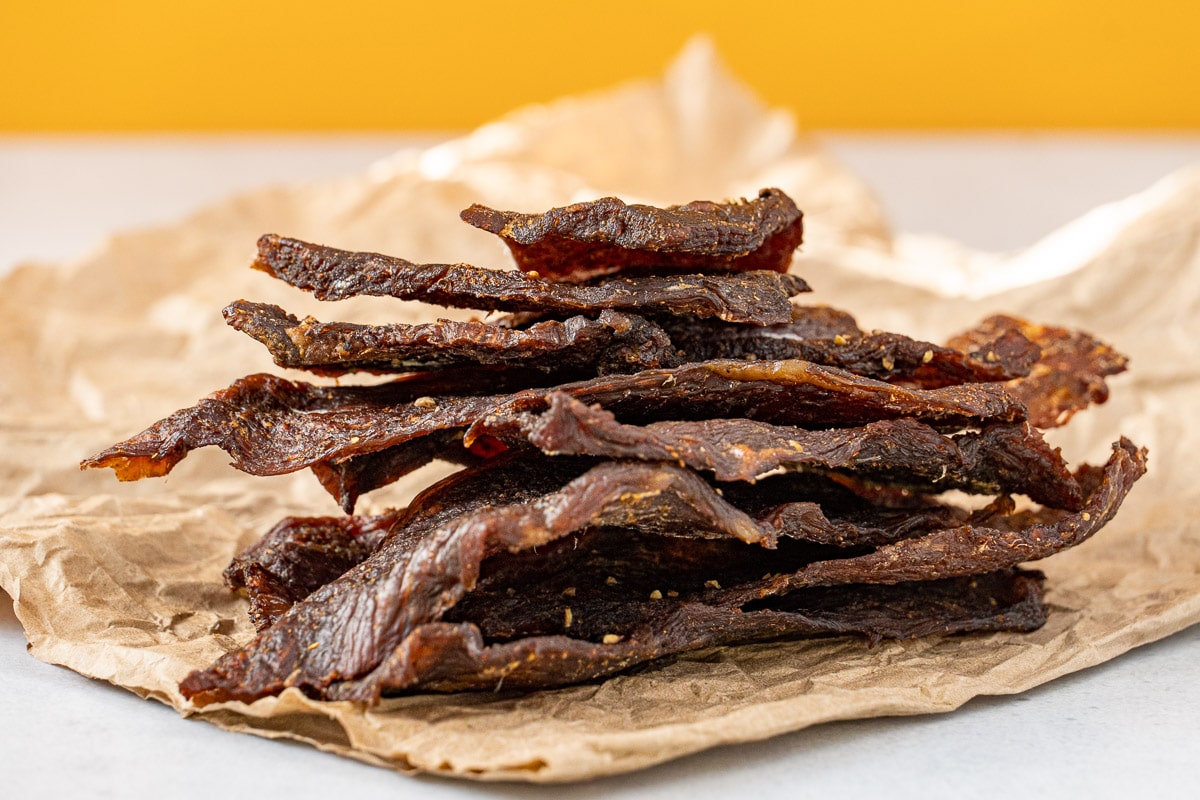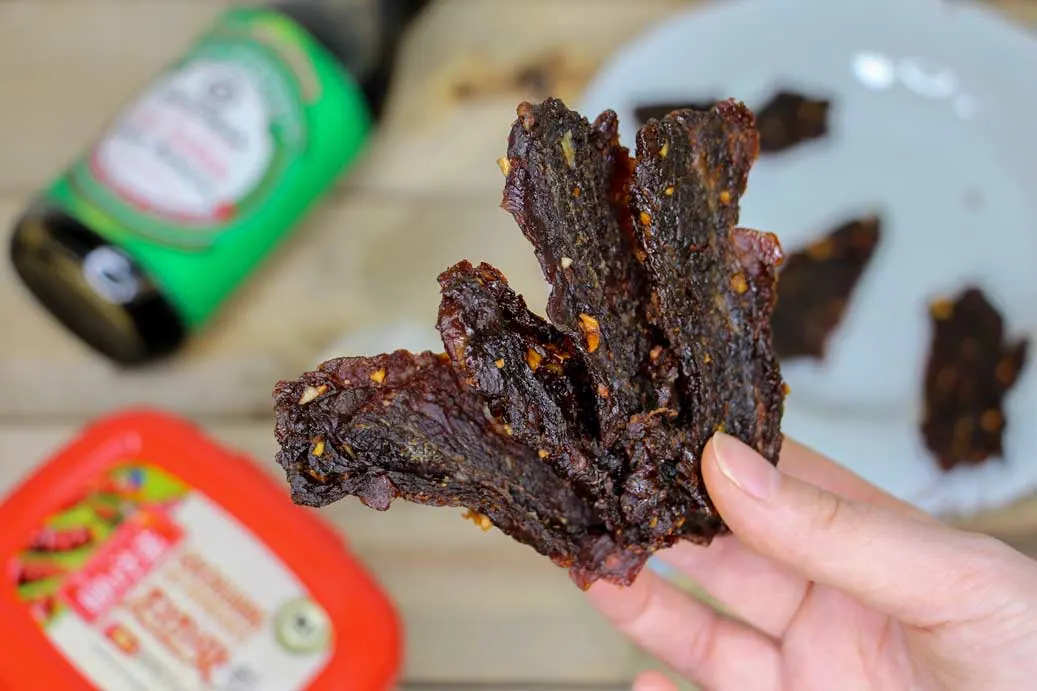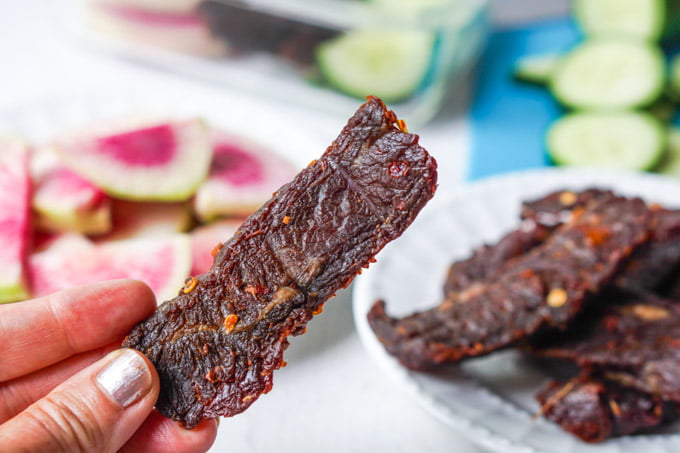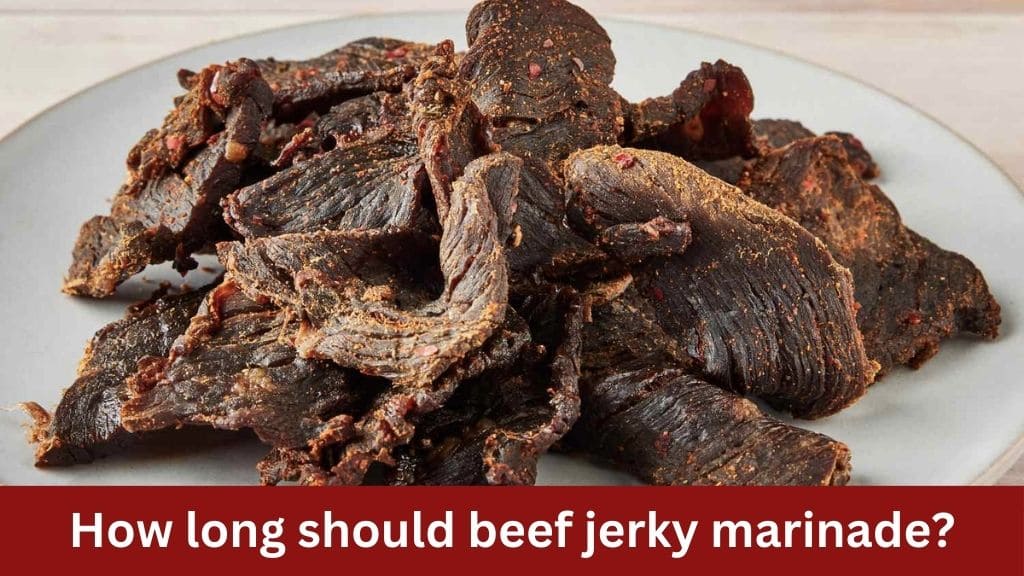Beef jerky is a delicious and popular snack enjoyed by many around the world. One of the key factors in creating flavorful and tender beef jerky is the marinade. Marinades infuse the meat with flavor and help tenderize it before the dehydration process. But how long should beef jerky marinade for optimal taste and texture? In this comprehensive guide, we’ll explore everything you need to know about marinating beef jerky to perfection.
Marinades serve multiple purposes when preparing beef jerky:
- Flavor infusion: Marinades are a blend of spices, herbs, acids, and oils that penetrate the meat, imparting flavor throughout.
- Tenderization: The acidic components in marinades, such as vinegar or citrus juice, help break down tough muscle fibers, resulting in a more tender jerky.
- Moisture retention: Marinades can help the meat retain moisture during the dehydration process, preventing it from becoming too dry and tough.
Factors Affecting Marinating Time

- Meat Thickness:The thickness of the meat slices plays a significant role in determining marinating time. Thin slices of meat have a larger surface area, allowing them to absorb marinade more quickly. In contrast, thicker slices require more time for the marinade to penetrate to the center of the meat.
- Flavor Intensity:The intensity of the flavors in the marinade can affect marinating time. Stronger-flavored marinades, containing ingredients like garlic, chili peppers, or soy sauce, may require shorter marinating times to prevent overpowering the taste of the meat. Conversely, milder marinades may need longer marinating times to fully infuse the meat with flavor.
- Marinade Ingredients:The composition of the marinade, particularly its acidic components, influences marinating time. Marinades containing acidic ingredients, such as vinegar, citrus juice, or yogurt, help tenderize the meat by breaking down tough muscle fibers. However, prolonged exposure to acidic marinades can lead to a mushy texture, so shorter marinating times are often recommended.
- Temperature and Environment:The temperature and environment in which the meat is marinated can affect the rate of flavor absorption. Marinating at room temperature allows the meat to absorb flavors more quickly than refrigerating. However, refrigeration is necessary for longer marinating times to ensure food safety. Additionally, warmer environments may accelerate the marinating process, while colder temperatures slow it down.
- Duration:The duration of marinating time depends on various factors, including personal preference, recipe requirements, and the desired flavor profile. While shorter marinating times may suffice for some recipes, others may benefit from longer marination periods to achieve optimal results. It’s essential to strike a balance between allowing enough time for the marinade to work its magic and preventing the meat from becoming overly saturated or mushy.
General Guidelines for Marinating Beef Jerky
:max_bytes(150000):strip_icc()/how-to-make-beef-jerky-4775124-hero-01-1-7bf42ab1525849738c55bb02c436f5cc.jpg)
- Thin Slices (1/8 to 1/4 inch):For thinly sliced meat, such as strips cut against the grain, marinate for 2 to 4 hours at room temperature or up to 24 hours in the refrigerator. Thin slices have a larger surface area, allowing them to absorb marinade more quickly.
- Thick Slices (1/2 inch or more):Thicker slices of meat require longer marinating times to ensure the flavor penetrates to the center of the meat. Marinate thick slices for 4 to 8 hours at room temperature or up to 48 hours in the refrigerator. This extended marinating time allows the flavors to infuse deeply into the meat.
- Intensity of Flavors:Adjust marinating times based on the intensity of the flavors in the marinade and personal preference. Stronger-flavored marinades may require shorter marinating times to prevent overpowering the taste of the meat, while milder marinades may benefit from longer marination periods.
- Temperature and Environment:Consider the temperature and environment in which you’re marinating the meat. Marinating at room temperature allows for faster flavor absorption, while refrigeration is necessary for longer marinating times to ensure food safety. Warmer environments may accelerate the marinating process, while colder temperatures slow it down.
- Duration:The duration of marinating time ultimately depends on factors such as recipe requirements, flavor preferences, and the desired outcome. While shorter marinating times may suffice for some recipes, others may benefit from longer marination periods to achieve optimal flavor and tenderness.
- Monitoring and Adjustments:Throughout the marinating process, periodically check the meat to ensure it’s absorbing the marinade evenly. If using a resealable bag or container, gently massage the meat to redistribute the marinade and ensure thorough coating. If necessary, adjust marinating times based on visual cues and taste tests.
- Experimentation:Don’t be afraid to experiment with different marinades, ingredients, and marinating techniques to find what works best for you. Keep notes on marinating times and flavor combinations to refine your process with each batch of beef jerky.
When is Beef Jerky Done in a Dehydrator?

- Texture Tells: One of the primary indicators of done beef jerky is its texture. When you pick up a piece of jerky and bend it, it should feel firm and pliable, yet still retain some flexibility. The jerky should bend without breaking or snapping outright. If it’s too brittle and snaps easily, it’s likely over-dehydrated. On the other hand, if it feels too soft and lacks resistance, it may need more drying time.
- Visual Verification: Visual cues can also help determine the readiness of beef jerky. Perfectly dehydrated jerky will have a consistent color throughout. Dark spots or overly light areas may indicate uneven drying, suggesting that some sections of the jerky may need more time in the dehydrator. Additionally, any visible moisture on the surface or beads of fat are signs that the jerky needs more drying time.
- The Touch Test: The surface of properly dehydrated beef jerky should be dry to the touch, but it may still have a slight tackiness. This tackiness is perfectly normal and desirable, as it indicates that the natural sugars in the meat have caramelized during the dehydration process. However, if the jerky feels wet or overly sticky, it’s a sign that it needs more drying time.
- Safety First: Ensuring the safety of beef jerky is paramount. The internal temperature of the jerky should reach at least 160°F (71°C) to kill any harmful bacteria and pathogens. If you’re unsure about the dehydrator’s temperature consistency, consider placing the jerky in a preheated oven for 10 minutes near the end of the dehydration process to guarantee that the internal temperature reaches the recommended level.
Factors Affecting Dehydration Time:
- Meat Thickness: Thin slices of meat dehydrate more quickly than thicker slices.
- Humidity and Room Temperature: High humidity can prolong dehydration time, while cooler rooms may slightly increase it.
- Type of Meat: Lean cuts dehydrate more efficiently than fattier cuts due to their lower fat content.
- Dehydration Method: Dedicated dehydrators with built-in fans and temperature controls are more efficient than ovens or other methods.
Tips for Marinating Beef Jerky

- Pierce the Meat:Before marinating, use a fork or meat tenderizer to pierce the surface of the meat. This allows the marinade to penetrate more deeply, resulting in more flavorful jerky.
- Massage the Marinade:Thoroughly rub the marinade into the meat, ensuring that every surface is coated evenly. Massaging the marinade into the meat helps distribute the flavors and tenderize the meat more effectively.
- Use a Resealable Bag:Marinate the meat in a resealable plastic bag rather than a bowl or container. This allows for easier cleanup and ensures that the meat is fully submerged in the marinade, resulting in more consistent flavor distribution.
- Rotate the Bag:Periodically rotate the bag of marinating meat to ensure that all sides are evenly coated with the marinade. This helps prevent uneven flavor distribution and ensures that every piece of jerky is equally flavorful.
- Experiment with Ingredients:Don’t be afraid to experiment with different marinade ingredients to create unique flavor profiles. Try incorporating spices, herbs, acids, and oils to create marinades that suit your taste preferences.
- Keep it Simple:Sometimes, less is more when it comes to marinades. A simple marinade of salt, pepper, soy sauce, and a touch of honey or brown sugar can yield delicious results. Experiment with different combinations of ingredients to find what works best for you.
- Monitor and Adjust:Throughout the marinating process, periodically check the meat to ensure that it’s absorbing the marinade evenly. If necessary, adjust the marinating time or add more marinade to ensure that the meat is adequately flavored.
- Preparation:Ensure that the meat is properly prepared before marinating. Trim any excess fat and slice the meat against the grain for a more tender jerky. Additionally, consider partially freezing the meat before slicing to achieve more uniform slices.
- Temperature Considerations:Marinate the meat at room temperature for faster flavor absorption, or refrigerate for longer marinating times to ensure food safety. Be mindful of the temperature and environment to prevent spoilage.
- Take Notes:Keep track of your marinade recipes and any adjustments you make for future reference. This allows you to refine your technique with each batch and create consistently delicious beef jerky.
Conclusion
Marinating beef jerky is an essential step in creating flavorful, tender, and delicious snacks. By understanding the factors that influence marinating time and following general guidelines, you can ensure your jerky turns out perfectly every time. Experiment with different marinades, techniques, and ingredients to find the combination that suits your taste preferences. With a little patience and creativity, you’ll be enjoying homemade beef jerky that rivals any store-bought variety. Happy jerky-making!


:max_bytes(150000):strip_icc()/142948-docs-best-beef-jerky-DDMFS-4x3-1e55e285782844cd82756628d579a6dd.jpg)



